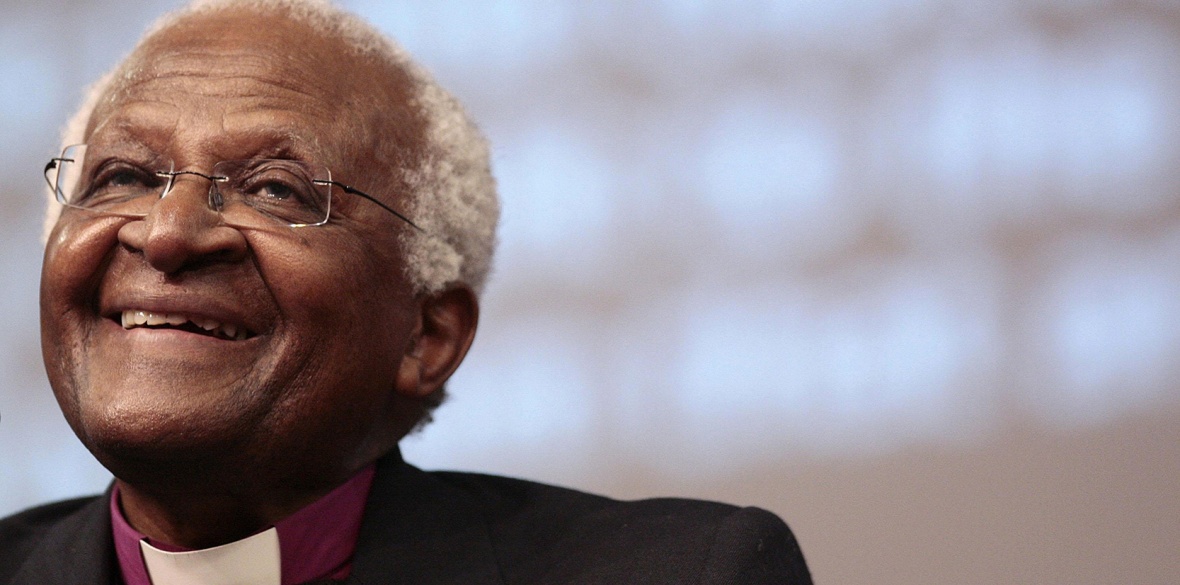This is the last article you can read this month
You can read more article this month
You can read more articles this month
Sorry your limit is up for this month
Reset on:
Please help support the Morning Star by subscribing here
DESMOND TUTU — “Arch” to his many friends and admirers — was a remarkably progressive Anglican leader.
Known globally for his uncompromising anti-apartheid campaigning, he was also well ahead of his time on other agendas.
He tried to persuade the church to ordain women, he opposed exclusion of priests from the LGBTQI+ community and, very unusually for a Christian leader of his generation — he died aged 90 — Tutu publicly favoured assisted dying.
He was an inspiration for human rights activists globally, speaking out for example against homophobic laws in Uganda and elsewhere in Africa where gay rights have been viciously suppressed.
He supported the democracy movement in Burma/Myanmar, yet wrote with sorrow and honesty to Aung San Suu Kyi about her collusion over the Rohingya massacres.
Possessing an inspirational way with words, he was a fearless preacher, able to rouse a great audience to raucous excitement, he could also drop to a whisper, pausing, holding everyone in the palm of his hand, often with engagingly impish wit.
He was a visionary activist who cut through to all, revolutionary or ruler, poor or powerful.
His irrepressible courage and eloquence as a Christian leader made him almost invincible, even to a brutal police state.
When Mandela and his fellow anti-apartheid leaders were two decades into their imprisonment on Robben Island, Arch came to increasing prominence as an opponent of racist tyranny, speaking at rallies and funerals, leading protests, his voice heard across the world.
Apartheid’s rulers had assassinated, tortured, jailed and muzzled critics, but couldn’t silence the first ever black Archbishop of Cape Town, with his multiracial congregation and his increasingly prominent global Christian platform.
Desmond Tutu’s blunt honesty in speaking truth to power was his hallmark, along with his independent spirit and integrity.
When Winnie Mandela appeared before him at the Truth and Reconciliation Commission, established by president Mandela, Arch was firm about her tragic descent from brave fighter for justice and victim of vicious police oppression, into criminal complicity in murder.
He was also tough with former president FW de Klerk, who’d released Mandela but refused to apologise for apartheid crimes committed on his watch, even while negotiating the transition from apartheid.
De Klerk stormed out of the commission in high dudgeon after it had heard evidence of awful, bloodcurdling atrocities by apartheid security agents.
After Mandela became president, with ANC MPs under fire for accepting big salary increases, Arch quipped: “The government stopped the gravy train long enough to get on it.”
A few months later, Mandela announced a cut in MP salaries and his own.
Tutu was an uncompromising custodian of the values of the freedom struggle — human rights, equality, justice — and highly critical of Mandela’s successors, first Thabo Mbeki for his terrible HIV-Aids denialism, then Jacob Zuma for his shameless corruption and looting which has left the once proud ANC badly discredited and the economy in bad shape, with poverty and unemployment rampant.
Both the ANC’s and South Africa’s future depends upon listening acting on the wisdom of the remarkable, unique, Desmond Tutu.
Peter Hain’s memoir A Pretoria Boy: South Africa’s ‘Public Enemy Number One’ was recently published by Icon.








